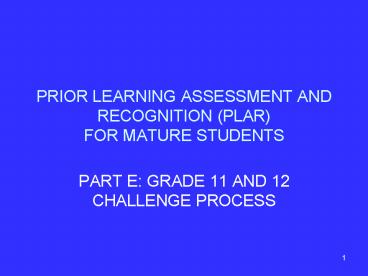PRIOR LEARNING ASSESSMENT AND RECOGNITION (PLAR) FOR MATURE STUDENTS - PowerPoint PPT Presentation
1 / 17
Title:
PRIOR LEARNING ASSESSMENT AND RECOGNITION (PLAR) FOR MATURE STUDENTS
Description:
prior learning assessment and recognition (plar) for mature students part e: grade 11 and 12 challenge process policy/program memorandum no. 132 highlights of grade ... – PowerPoint PPT presentation
Number of Views:87
Avg rating:3.0/5.0
Title: PRIOR LEARNING ASSESSMENT AND RECOGNITION (PLAR) FOR MATURE STUDENTS
1
PRIOR LEARNING ASSESSMENT AND RECOGNITION (PLAR)
FOR MATURE STUDENTS
- PART E GRADE 11 AND 12 CHALLENGE PROCESS
2
POLICY/PROGRAM MEMORANDUM No. 132
- Highlights of Grade 11 and 12 Challenge Process
in PPM 132 - results in up to 10 Grade 11 and 12 credits
(maximum 10 through combined equivalency and
challenge processes) - credits earned are entered as percentage grades
on the OST and appear in the same way as credits
earned by taking the course - students must challenge for credit for an entire
course, whether it is a full- or half-credit
course - students must provide evidence that they are
likely to be successful in challenging a specific
Grade 11 or 12 course
3
PPM 132 Highlights continued
- there are some courses students may not challenge
for credit - challenge assessments include 70 formal tests
and 30 other assessments - challenge assessments must be based on curriculum
expectations and achievement charts in Ontario
curriculum policy documents - challenge assessments must be based on all
strands, all categories and descriptions of
levels of achievement for the discipline/subject
4
PPM 132 Highlights continued
- students may challenge for a credit in a course
for a second time after a reasonable interval and
after providing evidence of readiness for a
second challenge - a challenge assessment is not an independent
study course there is no teaching component to
the process it is a series of summative
assessment activities
5
The Principal is Responsible for
- Developing and administering formal tests
- Determining the assessment strategies most
appropriate for each course - Record keeping
- Reporting
- Ensuring that only teachers certified by the
Ontario College of Teachers conduct the PLAR
challenge process
6
Courses that may not be challenged
- a course previously failed
- a course for which the student has already earned
a credit but for which he or she wishes to
improve the mark - a course in any subject if a credit has already
been granted for a course in that subject in a
later grade - a course for which there is significant overlap
with a course for which credit has been granted - a transfer course
- a locally developed course
7
Courses that may not be challenged continued
- a cooperative education course
- a course in English as a second language (ESL),
English literacy development (ELD) if the student
has one or more credits in English from OSS or
OSIS curriculum documents/guidelines - a course in French as a second language (FSL) if
the student has one or more credits in Français
from OSS or OSIS curriculum documents/guidelines - the Ontario Secondary School Literacy Course
8
Types of Evidence for Challenge
- Mature students may use certificates or other
records of accomplishment earned outside Ontario
classrooms as reasonable evidence of eligibility
to challenge for credit for a related course
within the Ontario curriculum, if they wish to
earn credit for the course without taking the
course (p. 9, PPM 132) - See Application to Challenge for Credit for a
Course (Appendix 2, PPM 132) for a list of types
of evidence
9
Grade 11 and 12 Challenge Process Implementation
Phases
- Orientation
- Application
- Assessment
- Recording
- Reporting
10
Grade 11 and 12 Challenge Assessments must be
- Based on curriculum expectations and achievement
charts in Ontario curriculum policy documents - Based on all the strands in a course and all
categories of knowledge and skills and the
descriptions of achievement levels given in the
achievement chart that appears in the curriculum
policy document for the discipline - Comprised of 70 formal tests and 30 other
assessments
11
Formal Tests
- To include a balance between written work and
practical demonstrations that is appropriate for
the subject/discipline
12
Other Assessments
- May include evaluation of written assignments,
demonstrations/performances, laboratory work, and
quizzes, and observation of student work
13
Grade 11 and 12 Sample Challenge Assessment Guides
- 16 courses
- samples may be used, at discretion of
principal - guides not assessments per se, require
further development - Note the principal is responsible for
determining which assessment strategies are most
appropriate for each course
14
Features of Grade 11 and 12 Sample Assessment
Guides
- Reflect appropriate balance between written work
and practical demonstration - Based on all strands, all categories and
achievement chart for subject/discipline - Ensure compliance/consistency with the provincial
PLAR policy and provincial curriculum and
assessment policy
15
Components of Grade 11 and 12 Sample Assessment
Guides
- Overall Expectations
- Assessment Focus
- Assessment Summary
- Teacher Notes, where appropriate
- Assessment Activities usually 3-5 formal
tests and 3-5 other assessments - Suggested Assessment Tools
- Appendices (in some guides only)
16
Use of Grade 11 and 12 Sample Assessment Guides
- Options for use of guides
- as is with further development
- adapt activities to meet needs of students
- replace some activities and use others
- design own challenge assessment(s)
- See also Notes for Teachers Developing Grade 11
and 12 Challenge Assessments (Appendix E.5)
17
Appendices
- Letters, form, suggestions, notes, information
sheet for students - To be used at the discretion of the principal































